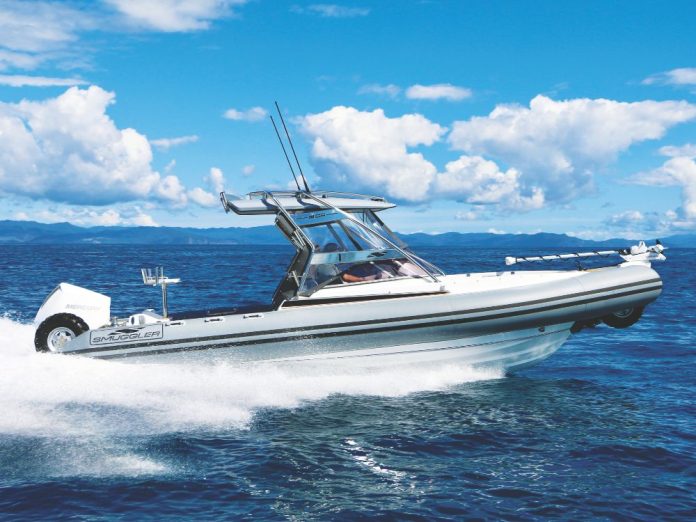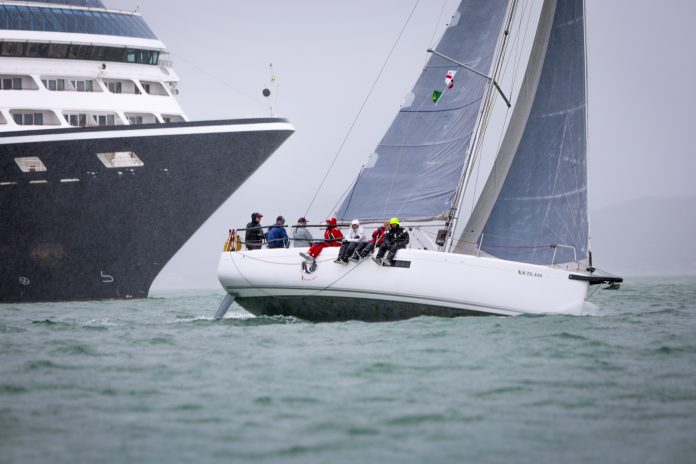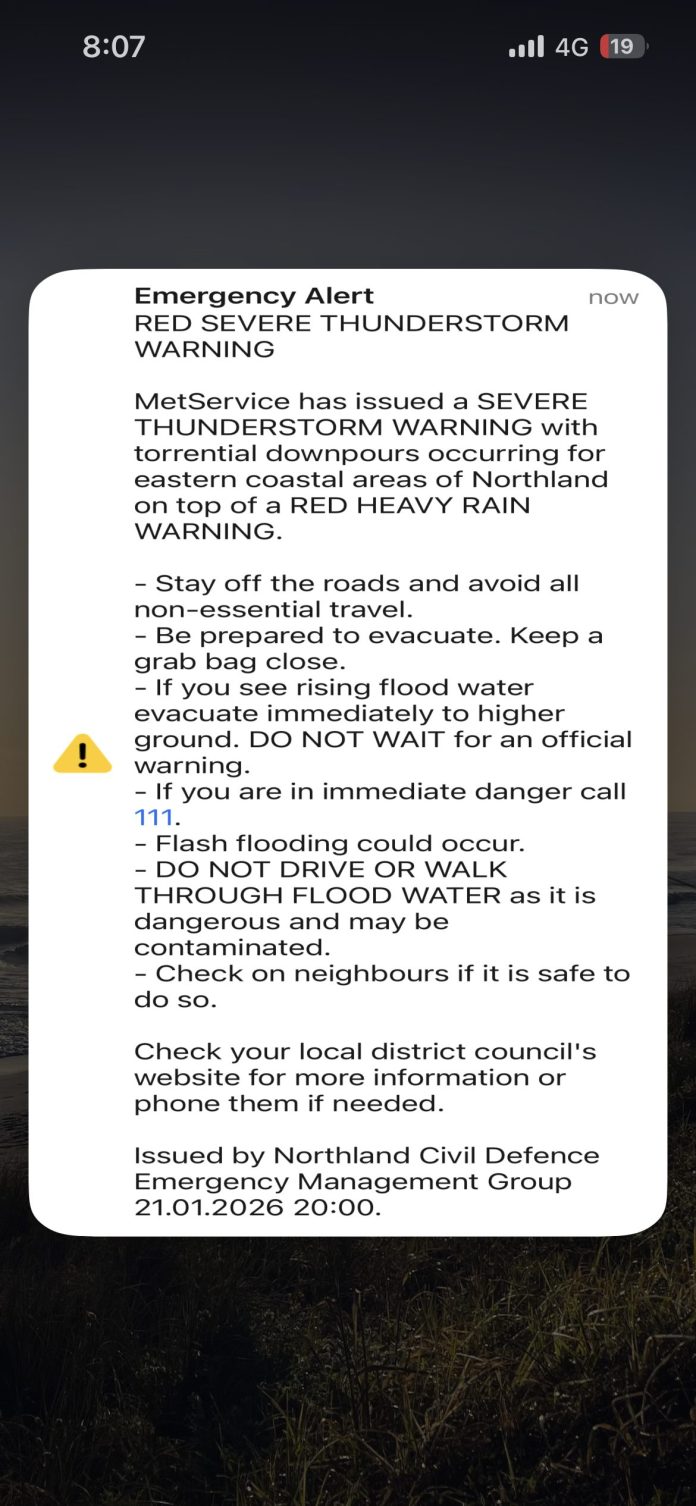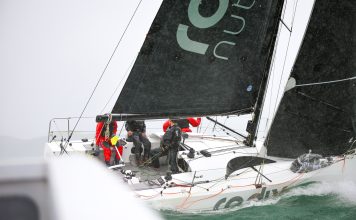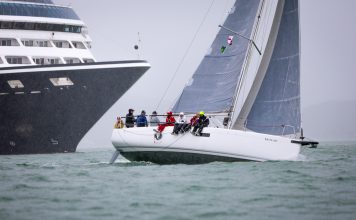New Zealand has led the world in the development of small amphibious recreational boats, and hundreds of Kiwis have taken to the concept of a boat which is essentially its own trailer, with the ease of launching, retrieving and storage that allows.
Mover smart
The latest model of Smuggler Strata amphibious RIB also has a few new tricks up its sleeve, including seating for 10, a layout providing a walk-through, one-level platform for fishing and diving, and a quieter, more efficient electric-over-hydraulic drive system for the amphibious gear.
The 800SS was released at the end of 2024 and was on show at the Auckland on-water and Hutchwilco boat shows this year. The SS part stands for ‘Super Sport’, meaning that rather than having a centre-console setup, it has a little hardtop and more traditional helm and passenger seats, like a typical bowrider trailer boat.
It’s based on the popular Smuggler 780 Super Sport RIB, with the addition of an amphibious setup: three permanent wheels, driven by an electric-over-hydraulic system designed by Kiwi company Anura. This new-generation 28 kW electric engine saves weight and removes the logistical hassle of having a separate petrol-driven motor to run on-land operations while still offering the proven reliability of hydraulic operation. It’s also quieter than a petrol engine – and there are no smelly fumes.
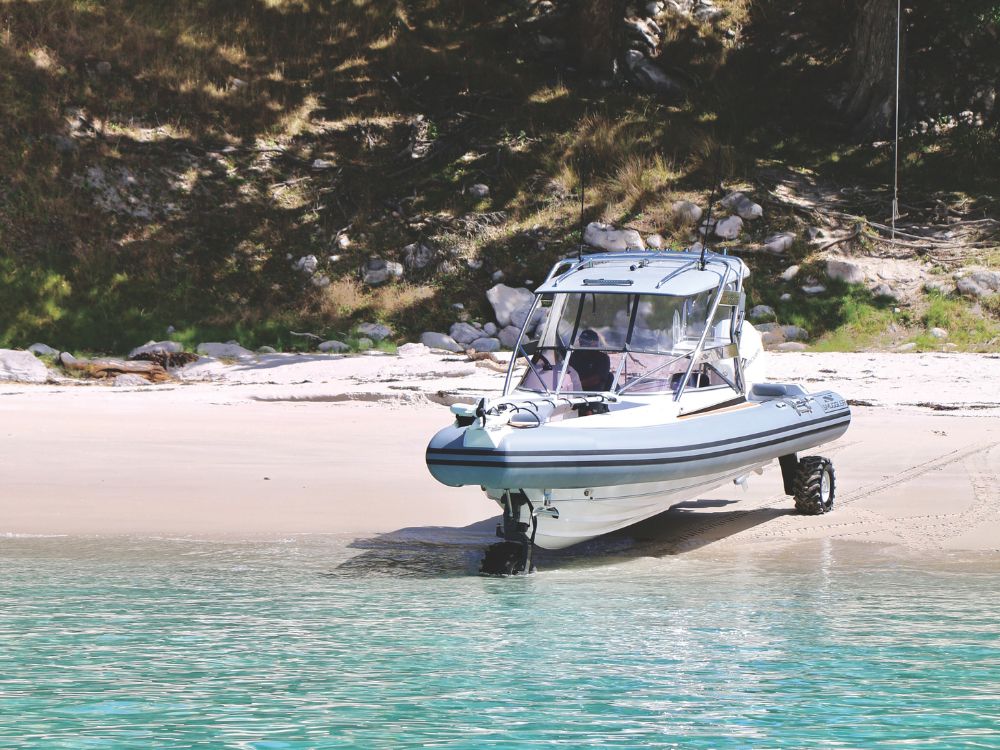
On the water, the 800SS is driven by a sleek and streamlined Mercury Verado 300 hp V8. This new-generation engine is lighter and more fuel-efficient than a V6 would have been a few years ago, plus it has a grunt and a 115-amp alternator, which can be used to recharge the electric battery for the drive system when running at sea (more on this soon).
The hull shape for the 800SS has the deepest vee of all the Smuggler models, at 27.5 degrees. The generous pontoons give it stability at rest, but the deeper vee means when the boat is planing, a much smaller portion of the hull is in contact with the water. Deep vee hulls also provide a much softer ride.
When raised, the front wheel of the amphibious gear lifts right up into a recess in the D-tube in the bow. David Pringle of Smuggler says tucking the front wheel out of the way like this makes the boat a lot drier, as it isn’t breaking the bow wave.
“When you’re in choppier conditions, with the wheel tucked into the duck’s bill out the front, air and water can travel down the side of the boat and not over the front. I’ve had this out in quite extreme conditions, and it stays much drier.”

The trim tabs are also recessed into the hull, at the transom, which means legs and lines are less likely to get tangled up in them when at sea, and it’s tidier when the boat is up on the beach, too. At sea, the two rear wheels fold right up against the flat face of the transom, inside the tubes, and when you’re on land and the boat is ‘squatted’ into a resting posture, it’s easy to step over the transom and down onto the sand using a step integrated into the ‘leg’ of the wheel.
The inflatable tubes are in a carbon-finish Hypalon, which creates a non-reflective, satin surface with a slight woven texture. This means the tubes don’t heat up so much in the sunshine and are grippier to touch or walk on. The tubes taper to a point at the back, providing support and buoyancy aft; another advantage of having the electric engine driving the hydraulic gear is no petrol engine exhaust coming out of a hole in the transom here.
On board
On board, the boat offers a decent-sized cockpit, lined with teak-look U-Dek foam, with two small seats on each side of the outboard and two padded rear-facing passenger seats forward. The driver’s seat, to starboard, and the port passenger seat are elevated and sheltered by the hardtop, which has a small fixed windscreen and removable clears to enclose this whole area.

Opening the centre panel of the screen, it’s a step-through to the bowrider area, where squabs in a V arrangement with lockers underneath provide seating for four more, or plenty of room to fish. A clip-on cover keeps this area dry when underway, and is easily removed to open the bow right up. To get up to the bow without coming through the ‘cabin,’ you can also inch your way around the outside of the hardtop on a panel of U-Dek which provides grip.

The compact electric motor to run the hydraulics is tucked away under the port aft-facing passenger seat, with a pair of Victron 24-volt batteries under the starboard seat. There is no house battery; everything is run off this bank, with a Safety DC-DC charger converting the power to 12 volts where it’s required.
The batteries are rechargeable, not only through being plugged in onshore, but also through being charged off the outboard alternator, meaning the energy used to power the wheels on the quick trip down the road to the beach and into the sea can be topped up while you’re out on the water. Up to 10 percent per hour of the charge can be replenished this way – enough to get you back out of the sea and up the road – which takes any ‘range anxiety’ out of the picture. The batteries actually contain enough energy to drive on land for up to two hours – something you’d never have to do in real life.
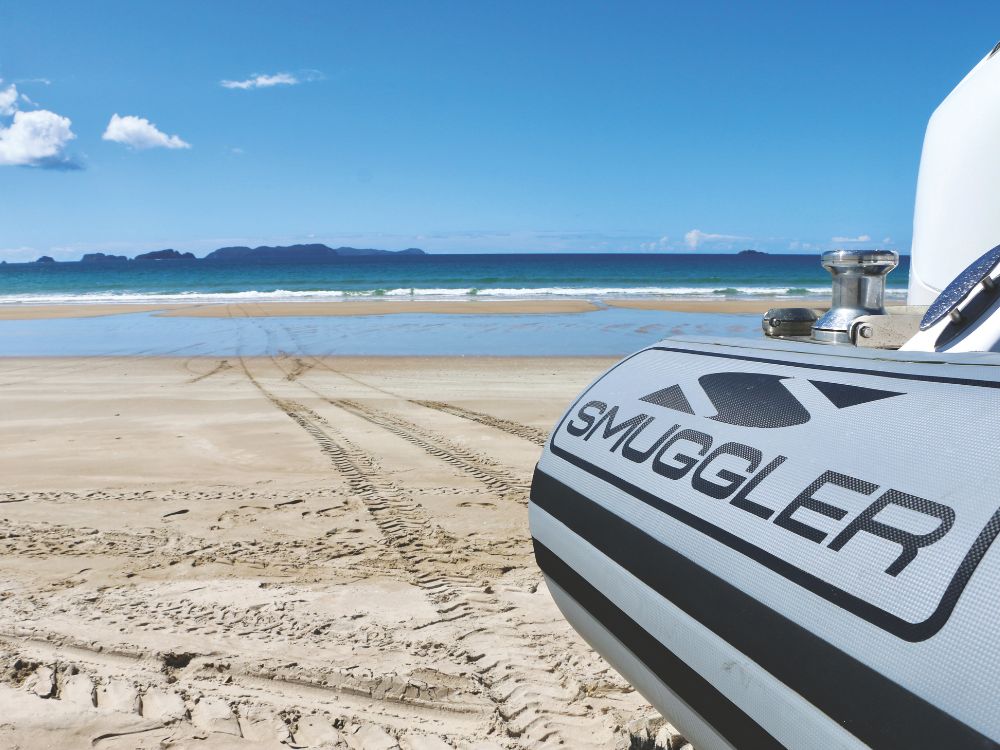
Although the 800SS amphibious is based on its water-only cousin, the Smuggler 780SS, the hulls are constructed differently, with weight being stripped out of the amphibious version to offset the addition of the Anura system. All the additions required for amphibious operation add up to around 450 kg, but around 300 kg has been stripped out of the hull, so the boat is not significantly heavier than its non-amphibious cousin. The V8 Merc is more than able to move it along at pace.
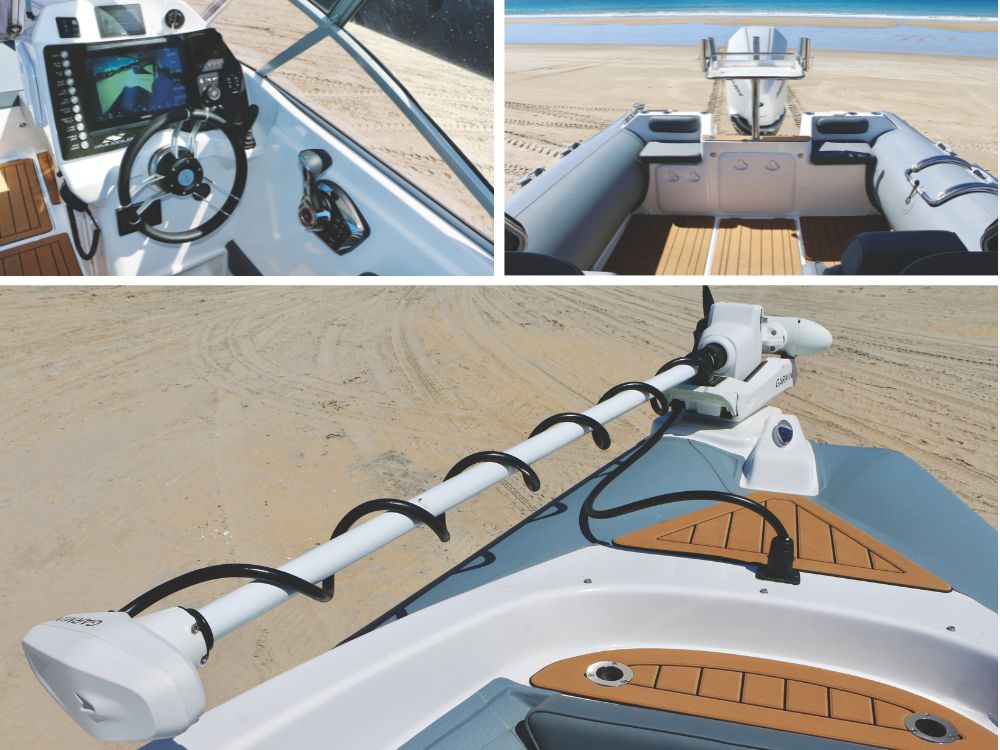
Real-world use
To try out the Smuggler, we were invited down to Ōpito Bay on the Coromandel’s east coast. Those lucky enough to have a bach at Ōpito would like to keep it a secret, so let’s just say it’s probably one of New Zealand’s best beaches, and while you have to show some commitment to get there – down a winding road which is still gravel in places – it’s well worth the effort.

It’s also home to quite a colony of Smuggler amphibious RIBs. Like Onetangi on Auckland’s Waiheke Island, Ōpito is an ideal place for these boats, with easy launching straight off a white-sand beach and plenty of bach owners with deep pockets. Mr Smuggler himself, David Pringle, and his wife, Pauline, have a bach there, and this 800SS is his personal fishing and boating companion.
It’s a bit of a strange feeling, driving down the road in a boat – though you get the impression Dave’s neighbours at Ōpito have seen it all before. People out walking their dogs give a smile and a wave but don’t otherwise bat an eyelid. But this, surely, is the way to travel: instead of faffing around with trailers, tractors, backing, parking etc, we can literally just drive down the road to the beach … and drive into the water.
Having driven steadily into the light surf – Dave says you can launch in pretty much whatever conditions a trailer boat can handle, so swells of up to about 1.5 m – we are quickly past the breakers and fully afloat. Then it’s time to switch systems and get the outboard powered up.
Outboard engaged and wheels lifted and stowed away, we’re off cruising at a very comfortable 22 knots. The sun has come out, and the sea state is pretty smooth, giving us a good opportunity to test out both the speed and the turning and handling ability of the Smuggler. It comes up trumps in the latter category, the hull shape not digging too hard into the turn and remaining level and stable throughout. Speed-wise, Dave has had her up to 46 knots flat out, which, while thrilling, is a bit hard on the gas consumption (think around 88 litres/hour). But it does mean if you do need to get home in a hurry, the Smuggler is happy to oblige. At its cruising speed in the mid-20s, it’s burning around 44 litres/hour.

To reverse the process and find out how easy it is, we head down the eastern end of the beach and prepare to turn back into a land-based vehicle. We prepare for land mode by putting down the wheels and tilting the outboard up slightly (about 30 percent trim), then we just drive back out of the water and up the beach. Most people would see it coming and get out of the way, but for added safety, and to avoid driving over either children or logs or other obstructions, the Smuggler has a bow camera showing what’s down there.
Once up on the beach, the Smuggler can be ‘squatted down’ on its keel rather than sitting up high on its wheels, a courtesy to other beach users, Dave says, reducing its visual bulk and presence. Sitting the boat down also makes it easier to get on and off, over the transom step and down onto the sand without a big jump or reach. There’s also a curved ladder that folds down over the port-side tube for easy access to the sand, as well as being a swim ladder.
When it’s time to head back, no one has to wade out and bring the boat in to shore; we can simply hop in and drive away. It’s incredibly simple; we just drive down into the surf using the joystick for the electric motor, then deploy the outboard, push ‘auto up,’ and the wheels put themselves away.
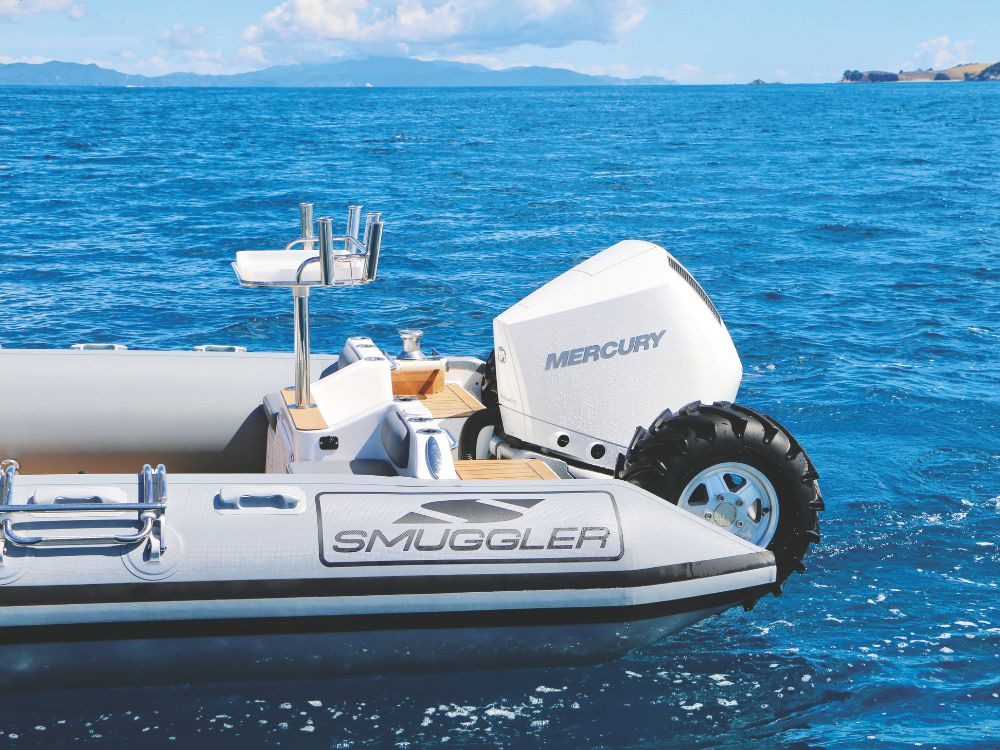
The Smuggler 800SS has all the ingredients for a handy, practical dayboat, without all the hassle of dealing with trailers and tractors. This particular boat is getting a lot of use as a fishing companion, with its Garmin Kraken trolling motor and cray-pot hauler, but it would be equally useful as a family boat for expeditions and picnicking around the coast. The amphibious setup provides huge practical advantages and is super easy to use, without significantly impacting the boat’s performance as, well, a boat – plus there’s the definite cool factor of being able to drive yourself ashore. Keep an eye out for one at a beach near you this summer. BNZ
Smuggler Strata 800SS highlights
Packages from: $390,000
Price as reviewed: $432,000
Manufactured by: Smuggler Marine (www.smuggler.co.nz)
Specifications
LOA: 8 m
Beam: 2.8 m
Deadrise: 27.5° at the transom
Power: 1 x Mercury 300 V8 O/B
Max power: 300 hp
Fuel capacity: 240 litres
Construction: GRP hull and decks, Hypalon tubes
Amphibious system: Anura S25 EOH
Cruise speed: 25–30 knots
Max speed: 46 knots
Highlights
- Super deep-vee hull is superb in the rough; tubes ensure the ride is dry
- The rig is super-easy to use and has a definite cool factor
- Handy, practical dayboat equally useful as a fishing companion or for family picnics and expeditions








